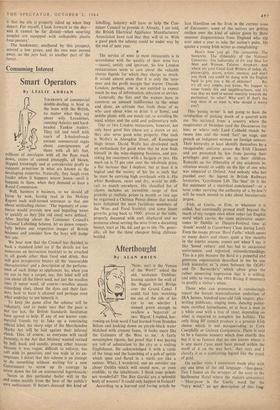Consuming Interest
Smart Operators
By LESLIE ADRIAN TOLERANCE of commercial double-dealing is bred in the bone with the British, no matter what they say about wily Levantines, cunning Asiatics and hard- headed Yankee traders. They tell and retell with roars of Schadenfreude ancient commercial sagas
about consignments of s:7 shoes with all left feet, millions of envelopes with all the flaps stuck down, crates of canned pineapple, all blown, shipped knowingly and at considerable profit to innocent primitives in what are known as the developing countries. Naturally, they laugh even louder when it happens nearer home—until it happens to them, when they demand at least a Royal Commission.
Well, business is business, as we should all know by now, having read in the Molony Report such well-turned sentences as that one about misleading claims: 'The ingenuity of com- merce would provide new and beguiling terms as quickly as they [the old ones] were defined.' After hearing about, the Consumer Council's National Labelling Scheme, let us pause respect- fully before our respective images of British business and consider how the boys will dodge this one.
We hear now that the Council has decided, to back a standard label (or if the details are too numerous an instruction booklet) to be attached to all goods other than food and drink, that will give prospective buyers all the 'measurable characteristics' and a description of the perform- ance of such things as appliances. So, when you set out to buy a carpet, say, this label will tell You about all the fibres used, not just the woollen ones (I mean wool, of course—woollen means something else), about the dyes and their fast- ness, how to have it cleaned and perhaps even What underlay to use beneath it.
To keep he game alive the scheme will be vOluntary, and to make sure that the pace is not too hot, the British Standards Institution have agreed to help. If any of our keener com- mercial friends try to fake up a convincing official label, the sharp edge of the Merchandise Marks Act will be laid against their infernal cheek. This, of course, as everyone will recall instantly, is the Act that Molony wanted revised by bell, book and candle, among other reasons because it was vague, difficult to enforce, too soft with its penalties, and too wide in its ex- emptions. I detect that this scheme is an attempt to do something without waiting for a new Government to screw up its courage to screw down the lid on commercial legerdemain.•
Steam in this particular boiler will in the end come mainly from the heat of the public's own enthusiasm. If buyers demand this kind of labelling, industry will have to help the Con- sumer Council to provide it. Already, I am told, the British Electrical Appliance Manufacturers' Association have said that they will sit in. With a good push the scheme could be under way by the end of next year.
The service of wine in most restaurants is in accordance with the quality of their wine lists --casual,, untidy and ignorant. So few London restaurateurs seem to care about the valuable vinous liquids' for which they charge so much. It would almost seem that it is only the turn- over and the profit margin that matter. Outside London, perhaps, one is not entitled to expect much by way of information, selection or service.
Generally the lists and the waiters have in common an amused indifference to the winer and diner, an attitude that leads those of us who care about wine to drink it at home, and imbibe plonk with our meals out, so avoiding the tepid whites and the cold and sedimentary reds.
One or two London restaurants, however, not only have good lists (there are a dozen or so), they also serve good wine properly. One such is Wolfe's in Abingdon Street, off Kensington High Street. David Wolfe has developed such an enthusiasm for good wine that he now finds himself in the wine-shipping business, and pro- viding his customers with a bargain or two. His mark-up is 75 per cent over the wholesale price, a flat increase that I deplore, but at least it is logical and the• variety of his list is such that he must be carrying high overheads with it. His white Bordeaux, sweet and dry, would be diffi- cult to match anywhere. His classified list of clarets includes an incredible range of first growths at realistic prices (a month or two ago he organised a Chateau Petrus dinner that would have delighted the most fastidious members of the Wine and Food Society), and some lesser growths going back to 1900: prices at the table, properly decanted with cork displayed and no nonsense about serving the wine from a decanting basket, start at 18s. 6d. and go to 60s.-70s. gener- ally, all but the three cheapest being chateau- bottled.














































 Previous page
Previous page